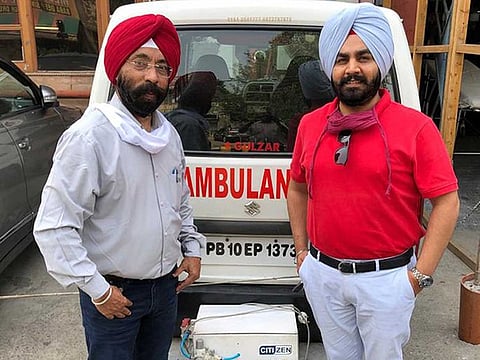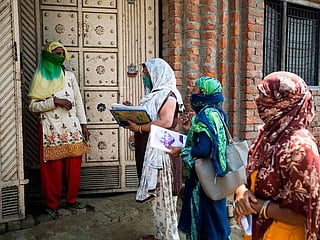COVID-19 forces traditional Indian businesses to undergo makeover
Entrepreneurs turn pandemic into opportunity and ensure workforce retains jobs

Also In This Package
New Delhi: The lockdown and restrictions due to COVID-19 has led to several entrepreneurs finding it impossible to keep their businesses afloat. But many have turned the pandemic into an opportunity and are not only doing brisk trade but also ensuring their workforce is able to retain their jobs.
However, in doing so, while some shut their traditional business completely and ventured into new territory, others became success stories by diversifying and combatting the coronavirus.
Reinventing is the key
Kamal Mehta, proprietor of Chakshu Enterprises, told Gulf News, “For more than two decades, I have been in the business of making industrial chemicals for Effluent Treatment Plants (ETP). Since the industrial units were closed during the lockdown, understandably, there was no demand for chemicals meant for the ETP.”

Like several others, the Ludhiana, Punjab-based businessman initially thought everything would be normal once the lockdown was over. But he was jolted when the lockdown was extended. Mehta said, “It was time to re-think. My workforce comprises local people and I felt it was my duty to ensure they were safe and financially secure. Hence, I assured all employees that we would be back in action soon.”
From diversifying into COVID-19 spray chemical that helps contain the virus to manufacturing sanitizer-walking tunnels, Mehta added new products in his portfolio. However, when he realised that many others were producing such products, he decided to do something more worthwhile.
“Environment protection has always been at the forefront of my life’s undertakings. I took it all in my stride and felt it was an indication that instead of following the trend, I must work towards long-term goals,” he reasoned.
Deciding to shelve his ETP business for the time being, he ventured into making cooling towers for industries. “This venture is close to my heart, as it involves environment-friendly practices. Cooling towers are necessary to remove heat from a building. Used in industries like power plants, petroleum refineries and various manufacturing facilities, it recycles water, and hence saves a lot of water,” he explained.
His goodwill in the industry has paid off and Mehta is set for new innings.
Uncharted territory
A number of players, from Jalandhar to Jodhpur and Haryana to Hyderabad, are treading new paths not only in a bid to stay relevant, but also to survive the current crisis.
Thirty-two-year-old Rahul Bajaj suffered a somewhat similar fate and had to shut down the family-run Shree Shakti Enterprises stainless steel cooking utensil business. As work came to a halt during the lockdown, Sonepat, Haryana-based businessman, who in 2010 had taken over the family business started by his grandfather in the 1950s, suddenly saw a bleak future.
With his kitchenware business in the doldrums, any chances of it picking up again seemed remote. He understood that for some time to come, people would not be keen on buying non-essential items, as saving money was becoming the norm.
On a chance visit to a hospital, Bajaj saw a handwash station and wondered how the machine could be innovated and engineered into a hands-free washing station and automatic foot sanitizer. The idea was to make it easy-to-use and economically viable.
He took the challenge and when the industries were allowed to open, without any layoffs in the company, Bajaj ventured into an uncharted territory. To begin with, he installed a handwash unit at his plant for the safety and sanitization of his own employees. Immediately, he received hundreds of orders from several companies and government institutions. From struggling to stay afloat, he has turned the crisis situation into a successful business venture.
Making way for the young
Equally inspiring is the case of Mumbai based executive A. Vasudevan, who after some introspection quit his well-paying job as a project in-charge with a company that produces painting accessories.
Vasudevan has started a venture YOS Fitness Solutions that manufactures safety equipment and essential products, including a foot-operated sanitizer dispenser, required for everyday use due to the coronavirus pandemic.

With hygiene becoming the buzzword, production of several products such as masks and gloves have been fast-tracked and have become a boon, especially for small-time manufacturers. As for the salaried class people, who contemplated offering their services for social causes, they never thought the opportunity would come to them through this route.
Providing details of the events that led to his resignation, Vasudevan said, “As soon as the lockdown came into effect, there was tremendous pressure on me from the bosses to reduce the staff working under me. For me, it was an immensely difficult decision to make. Since I am above 55 years of age, I felt I must take the initiative to quit in order to protect the jobs of the younger generation. Considering the current scenario, I also thought it would give me the opportunity to do something worthwhile for the society that I had been longing for.”
He emphasised: “The current mantra for everyone should be ‘health is wealth’, which is why I am applying my skills to creating low-cost wellness equipment. Through this venture, my long-term plan is to assist those with medical conditions by providing them access to fitness therapies that will require minimal/no medical expenditure.”
Changing dynamics
As life’s goals changed for many, some saw it as an opportunity to address shortfalls in the market. For them, it was an extension of product profiles, though not relevant to the core business. The idea was to adapt and stay resilient.
Malay Dikshit, founder of Piscium Health Sciences that manufactured deep-tech dental fillings for tooth cavities saw an uncertain future with no hope of his business picking up due to social distancing norms in the current scenario. He decided to reinvent his business model.

The Mumbai-based entrepreneur informed, “Coming from a science (chemistry) background, I explored the most essential commodities that were required during the pandemic and opted for hand sanitizer production.”
“Even as people were coming to terms with the lockdown, I had begun seeking permits to develop IpaSafe brand of sanitizer. When industries opened, very soon, we hit the market. Today, I feel content that I have launched a new business vertical and am helping the nation in my own way,” Dikshit added.
Not-for-profit
For Manjinder Singh Sachdeva, president, Bicycle Research and Development Organization, it was nation before self. Today, he is a role model for many in Punjab.
Ludhiana-based Sachdeva has developed a low-cost mechanized ambu-ventilator for ambulance along with his entrepreneur friend Vikram Chhabra, who manufactures products for the food and beverages industry.
Sachdeva asserted: “I felt it was not the time to think what our expertise lies in. The need of the hour was to use our abilities for community service rather than look for business prospects. Chhabra and I grasped that compared to India’s vast population the ratio of ventilators available in the country was less than .01 per cent, which can be a cause for worry during an emergency.
“R & D (for bicycles and sewing machines) being my core area, we designed a ventilator fitted with a mechanical device that is of utmost importance and crucial to keep the patients alive when being transported from home to hospital or from one city to the other.”
However, Sachdeva’s indigenous product is awaiting approval from Punjab government, as it is a life-saving device that requires fulfillment of certain procedures and protocols.
Sachdeva said: “We are working with a mission to help with medical infrastructural facilities and this ‘not-for-profit’ venture is our small contribution to society.”
Sign up for the Daily Briefing
Get the latest news and updates straight to your inbox











